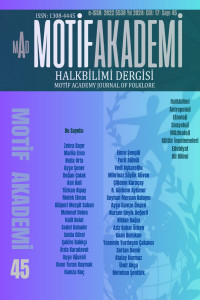Abstract
Bu çalışmada Michel Foucault’un, sanat ve iktidarın karşılıklı ilişkisinin yapısı hakkındaki düşünceleri incelenmiştir. Foucault, iktidarın sanat üzerindeki etkisini tartışırken, modern toplumların çeşitli kurumları ve disiplinleri aracılığıyla iktidarın yapısal durumunu çözümlemeye çalışmıştır. Bu çözümlemeyi de iktidar ve bilgi arasındaki ilişki temelinde oluşturmuştur. Foucault’ya göre, sanat ve iktidar ilişkisi bilgi düzeyinde ele alınmalıdır çünkü bilgi, toplumun belirli bir konuyu nasıl algıladığını ve bu algı üzerine nasıl hareket ettiğini şekillendirmektedir. Sanat, belirli bir bilgi türünün iletiminde ve dağıtımında işlevsel bir araç niteliğindedir. Bu nedenle Foucault, iktidar ve bilgiyi, ayrılamaz bir bütün olarak ele alırken iktidar, bilgi ve sanatın iç içe olduğu alanları araştırmıştır. Ona göre tüm bilgi türleri, belirli bir döneme özgü epistemolojik koşullar ve yapısal perspektiflerle ilişkilendirilir. Bu kavram, Foucault'nun sanatla ilgili düşüncelerinde de merkezi bir rol oynar ve sanatın kendi doğası içinde açımlanır. İktidar, episteme aracılığıyla belirli bir bilgi türünün üretimini kontrol eder ve dolayısıyla sanatın neyi temsil edeceğini belirler. Foucault, sanatı da bilgi jeneolojisi kavramı merkezinde ele almıştır. Çalışma, nitel bir araştırma olarak betimsel veri analizi yöntemiyle yapılandırılmış, alanyazından elde edilen veriler bu yöntem doğrultusunda değerlendirilmiştir. Sonuç olarak, Foucault’nun bu başlıklar altında ele alınan sanata ilişkin düşüncelerinin, bilgi temelinde incelemesiyle birlikte, sanat ile iktidar arasındaki ilişki üzerine bir kavramsal çerçeve çizilmiştir.
References
- Gündoğdu, H. (2012). Eleştiri ve Foucault. Cogito, Michel Foucault, Özel Sayı, 70-71.
- Foucault, M. (1995). Deliliğin tarihi. (çev.: Mehmet Ali Kılıçbay), Ankara: İmge.
- Foucault, M. (1999). Bilginin arkeolojisi. (çev.: Veli Urhan), İstanbul: Birey.
- Foucault, M. (2000). Özne ve iktidar. (çev.: Işıl Ergüden - Osman Akınhay), İstanbul: Ayrıntı.
- Foucault, M. (2001). Kelimeler ve şeyler. (çev.: Mehmet Ali Kılıçbay), Ankara: İmge.
- Foucault, M. (2011). Entelektüelin siyasi işlevi. (çev.: Işıl Ergüden - Ferda Keskin), İstanbul: Ayrıntı.
- Foucault, M. (2012). Doğruyu söylemek. (çev.: Kerem Eksen), İstanbul: Ayrıntı.
- Foucault, M. (2016). Cinselliğin tarihi. (çev.: Hülya Uğur Tanrıöver), İstanbul: Ayrıntı.
- Keskin F. (2000), Sunuş. Özne ve İktidar. İstanbul: Ayrıntı.
- Özalp, F. (2019). Foucault’da temel kavramlar ve sanat görüşleri üzerine bir deneme. Akademik Sosyal Araştırmalar Dergisi, 34, 486-495.
- Santini, S. (2001). Michel Foucault: Literature and the arts. SubStance, 31/1 (97), 77-84.
- Soussloff, C. M. (2010), Michel Foucault and the point of painting. Art History. Contemporary Perspectives on Method, 32 (4), 78-98.
- Tanke, J. (2009). Foucault’s philosophy of Art. New York: Continuum.
- Ziarek, K. (1998). Powers to be: Art and technology in Heideger and Foucault. Research in Phenomenology, 28, 162-194.
Abstract
In this study, Michel Foucault's thoughts about the structure of the mutual relationship between art and power are examined. While discussing the impact of power on art, Foucault tried to analyze the structural situation of power through various institutions and disciplines of modern societies. He created this analysis on the basis of the relationship between power and knowledge. According to Foucault, the relationship between art and power should be considered at the level of knowledge because knowledge shapes how society perceives a certain issue and how it acts upon this perception. Art is a functional tool in the transmission and distribution of a certain type of information. For this reason, while Foucault considered power and knowledge as an inseparable whole, he investigated the areas where power, knowledge and art are intertwined. According to him, all types of knowledge are associated with epistemological conditions and structural perspectives specific to a particular period. This concept also plays a central role in Foucault's thoughts about art and is explained within the nature of art itself. Power controls the production of a particular type of knowledge through the episteme and therefore determines what art will represent. Foucault also discussed art at the center of the concept of knowledge geneology. The study was structured as a qualitative research with the descriptive data analysis method, and the data obtained from the literature were evaluated in line with this method. As a result, a conceptual framework has been drawn on the relationship between art and power, with Foucault's thoughts on art discussed under these headings being examined on the basis of knowledge.
References
- Gündoğdu, H. (2012). Eleştiri ve Foucault. Cogito, Michel Foucault, Özel Sayı, 70-71.
- Foucault, M. (1995). Deliliğin tarihi. (çev.: Mehmet Ali Kılıçbay), Ankara: İmge.
- Foucault, M. (1999). Bilginin arkeolojisi. (çev.: Veli Urhan), İstanbul: Birey.
- Foucault, M. (2000). Özne ve iktidar. (çev.: Işıl Ergüden - Osman Akınhay), İstanbul: Ayrıntı.
- Foucault, M. (2001). Kelimeler ve şeyler. (çev.: Mehmet Ali Kılıçbay), Ankara: İmge.
- Foucault, M. (2011). Entelektüelin siyasi işlevi. (çev.: Işıl Ergüden - Ferda Keskin), İstanbul: Ayrıntı.
- Foucault, M. (2012). Doğruyu söylemek. (çev.: Kerem Eksen), İstanbul: Ayrıntı.
- Foucault, M. (2016). Cinselliğin tarihi. (çev.: Hülya Uğur Tanrıöver), İstanbul: Ayrıntı.
- Keskin F. (2000), Sunuş. Özne ve İktidar. İstanbul: Ayrıntı.
- Özalp, F. (2019). Foucault’da temel kavramlar ve sanat görüşleri üzerine bir deneme. Akademik Sosyal Araştırmalar Dergisi, 34, 486-495.
- Santini, S. (2001). Michel Foucault: Literature and the arts. SubStance, 31/1 (97), 77-84.
- Soussloff, C. M. (2010), Michel Foucault and the point of painting. Art History. Contemporary Perspectives on Method, 32 (4), 78-98.
- Tanke, J. (2009). Foucault’s philosophy of Art. New York: Continuum.
- Ziarek, K. (1998). Powers to be: Art and technology in Heideger and Foucault. Research in Phenomenology, 28, 162-194.
Details
| Primary Language | Turkish |
|---|---|
| Subjects | Art History, Theory and Criticism (Other) |
| Journal Section | Articles |
| Authors | |
| Publication Date | March 18, 2024 |
| Submission Date | September 19, 2023 |
| Published in Issue | Year 2024 Volume: 17 Issue: 45 |



